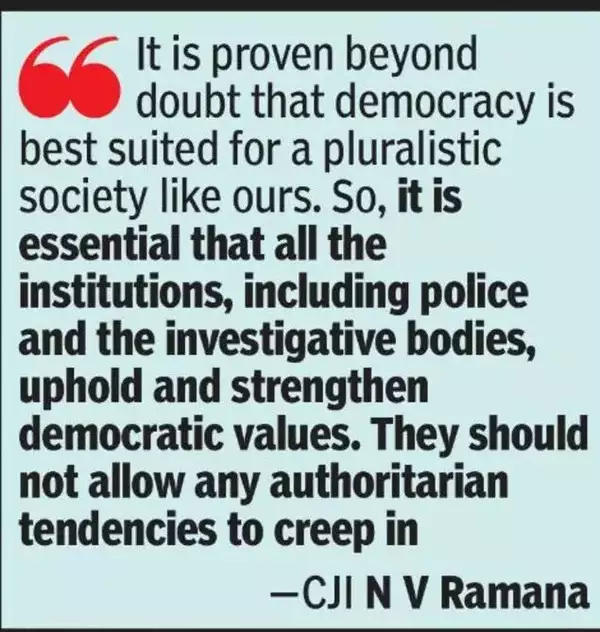Building faith in India’s investigative agencies
- An independent umbrella body that brings the various agencies under one roof holds the key to shoring up their credibility
Democracy in India
Given our experience with democracy so far, it is proven beyond doubt that democracy is best suited for a pluralistic society like ours. Our rich diversity cannot be sustained through dictatorial governance. It is only through democracy that our rich culture, heritage, diversity, and pluralism can be sustained and strengthened. We Indians love our freedom. So, it is essential that all the institutions including the police and the investigative bodies uphold and strengthen democratic values. They should not allow authoritarian tendencies to creep in.
The stature of Investigative agencies

The police and investigative agencies may have de-facto legitimacy, but as institutions, they are yet to gain social legitimacy.
- Police should work impartially and focus on crime prevention.
- They should work in cooperation with the public to ensure law and order.
- The CBI possessed immense trust in its initial phase but with the passage of time, it has also come under deep public scrutiny.
- People hesitate to approach the police in times of despair.
- The image of the institution of police is regrettably tarnished by allegations of corruption, police excesses, lack of impartiality and close nexus with the political class.
Need of the hour
- It is essential for agencies to reclaim social legitimacy and public trust.
- Role of leadership: The first step is to break the nexus with the political executive.
- The truth is, that no matter how deficient and non-cooperative the other institutions maybe if one institution stands by ethics and stands united with integrity, nothing can come in the way of duty.
- This stands true for all institutions.
- Here the role of leadership is important.
- The institution is as good, or as bad, as its leader.
- A few upright officers can bring a revolution to the system.
Issues affecting the system
- Lack of infrastructure, sufficient manpower, inhuman conditions, especially at the lowest rung, lack of modern equipment, questionable methods of procuring evidence, officers failing to abide by the rule book and the lack of accountability of erring officers. Issues that lead to delays in trials:
- Lack of public prosecutors and standing counsels seeking adjournments, arraying hundreds of witnesses and filing voluminous documents in pending trials, undue imprisonment of undertrials, change in priorities with the change in the political executive, cherry-picking of the evidence, and repeated transfers of officers leading to a change in the direction of the investigation.
- Representation of women in the criminal justice system: Their presence in the policing system will further encourage hesitant victims to approach the criminal justice system and report crimes.
- Relations between the community and police also need to be fixed. -Police training can help which includes sensitisation workshops and interactions to inspire public confidence. -It is imperative for the police and the public to work together to create a safe society.
Independent Umbrella organisation
- Reform of the police system is long overdue in our country. The Ministry of Home Affairs has itself recognised the glaring need for the same in the “Status Note on Police Reforms in India”. Unfortunately, our investigative agencies still do not have the benefit of being guided by a comprehensive law. The creation of an independent umbrella institution, so as to bring various agencies like the CBI, SFIO, and ED under one roof is the need of the hour
- This body is required to be created under a statute, clearly defining its powers, functions and jurisdictions.
- It is to be headed by an independent and impartial authority to be appointed by a committee akin to the one which appoints the Director of the CBI.
- The head of the organisation can be assisted by deputies who are specialists in different domains
- Separate and autonomous wings for prosecution and investigation to ensure total independence.
- With the police and public order under the State List, the burden of investigation is primarily on the state police.
- The proposed Central law for the umbrella investigative body can be suitably replicated by the states.
Benefits of such an institution:
- It will end the multiplicity of proceedings.
- A single incident these days gets investigated by multiple agencies, often leading to dilution of evidence, a contradiction in depositions, and prolonged incarceration of innocents.
- It will also save the institution from being blamed as a tool of harassment.
- A provision in the proposed law for an annual audit of the performance of the institution by the appointing committee will be a reasonable check and balance.
Conclusion
- Ultimately institutions must remember that their allegiance must be to the Constitution and the rule of law and not to any person. When they stand upright, they shall be remembered for their courage, principles and valour. The political executive will change with time, but an institution will be permanent. So, it needs to be independent, should pledge solidarity to service and fraternity is their strength.
Exam track
Prelims take away
- CBI
- Other independent investigation agencies - NIA, IB etc
Mains track
Q. Comment on the urgency to have necessary police reforms in India. (250 words)


